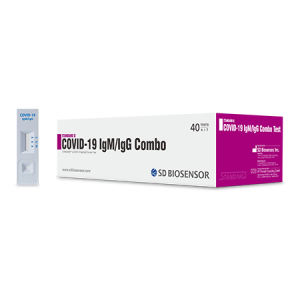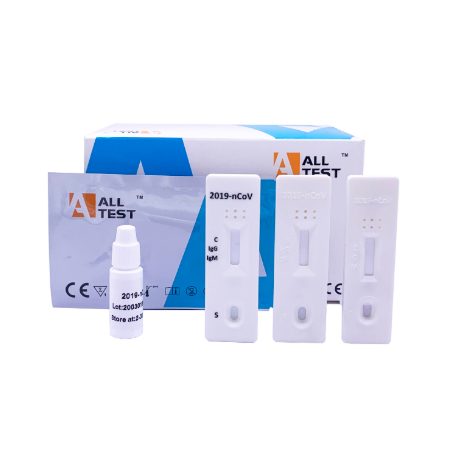Expected Use
The Rapid COVID-19 IgM/IgG Combo Test Kit is a lateral flow immunoassay intended for qualitative detection and differentiation of immunoglobulin M (IgM) and immunoglobulin G (IgG) antibodies against SARS-CoV-2 in human serum, acid citrate dextrose (ACD) plasma, and fingerstick whole blood. The fast COVID-19. The IgM/IgG Combination Test Kit is designed to help identify individuals with an adaptive immune system response to SARS-CoV-2, indicating recent or previous infection.
The COVID-19 IgM/IgG Rapid Combination Test Kit should not be used to diagnose or exclude acute SARS-CoV-2 infection. At this time, it is unknown how prolonged antibodies persist after infection and whether the presence of antibodies confers protective immunity. Serum and plasma testing are limited to laboratories certified under the Clinical Laboratory Improvement Program. Amendments of 1988 (CLIA), 42 U.S.C 263a, which meet the requirements for conducting moderate or high operations complexity tests.
Fingerstick testing of whole blood samples is limited to laboratories certified by the Clinical Laboratory Improvement Amendments of 1988 (CLIA), 42 U.S.C. §263a, who meet the requirements to hold a stop, Tests of moderate or waived complexity. The Fingerstick Whole Blood Sample Test is licensed for use in the Point of Care (POC), that is, inpatient care settings operating under a CLIA Certificate of Exemption, Certified of Compliance, or Certificate of Accreditation.
The results are for the detection of IgM and IgG SARS CoV-2 antibodies. IgM and IgG antibodies against SARS-CoV-2 are usually detectable in the blood several days after the initial infection, although the length of time the antibodies are present after infection is not well characterized. People may have a detectable virus present for several weeks after seroconversion.
Laboratories within the United States and its territories are required to report all results to the appropriate public health authorities. The sensitivity of the Rapid COVID-19 IgM/IgG Combination Test Kit after early infection is unknown. Negative results do not rule out an acute SARS-CoV-2 infection. If the acute infection is suspected, direct testing for SARS-CoV-2 is necessary.
False-positive results for the Rapid COVID-19 IgM/IgG Combination Test Kit may occur due to cross reactivity of pre-existing antibodies or other possible causes. Due to the risk of false-positive results, confirmation of positive results should be considered using a second, different IgG or IgM assay. The Rapid COVID-19 IgM/IgG Combination Test Kit is for use under the Food and Drug Administration Emergency Use Authorization.
Resume
COVID-19 is an acute infectious disease caused by the SARS-CoV-2 virus. The incubation period of the illness varies from 1 to 14 days, during which time infected people can infect other people. Acute SARSCoV 2 infection can also present without symptoms. Respiratory droplets and contact are the main routes of transmission Initial symptoms of patients include fever, fatigue, and cough, which may develop in dyspnea and other severe manifestations. Some of the severe cases may have acute respiratory distress septic syndrome or shock, or even death.
There is several days of incubation period after infection with the SARS-CoV-2 virus. IgM antibodies can be detected shortly after the incubation period and remain for a short time. IgG antibodies may appear after a few days of incubation period and remain in circulation in the blood for several weeks. A positive IgG result can be an indicator of a recent or previous infection.

Begining
Rapid COVID-19 IgM/IgG Combo Test Kit uses the principle of immunochromatography. Mouse anti-human IgM and human IgG antibodies are immobilized on the nitrocellulose membrane respectively, as two individual test lines (IgM line and IgG line) in the test window of the test device. The IgM line in the test window is closest to the sample well followed by the IgG line. As the test sample flows through the membrane inside the test device, the colloidal gold-recombinant antigen conjugate of the coloured COVID 19 virus is formed complexes with specific antibodies (IgM and/or IgG) against the COVID-19 virus, if present in the sample.
The antigen targets a segment of the SARS-CoV-2 nucleocapsid (N) protein. This complex progresses further the membrane to the test region where it is captured by anti-human IgM and/or human IgG antibodies coated on the membrane leading to the formation of a coloured band, indicating positive test results. The absence of this colour band in the test window indicates a negative test result. A built-in control line always appears in the test window when the test is successful, regardless of the presence or absence of antibodies against the new coronavirus 2019 in the sample.
Supplied Materials
- COVID-19 IgM/IgG Rapid Combination Test Kit
- Individual sample buffer
- 2 μL capillary pipette (serum and plasma only)
- 5 μL capillary pipette (finger prick only)
- Sterile safety lancet
- Insert package
Materials Required But Not Provided
- Clock or stopwatch, sample collection container, biohazard waste container, disposable gloves, disinfectant.
- External controls are not included with the kit but are commercially available from Megna Health under catalogue number: RAK-CON-001.
Storage
1. Store the test device at a temperature of 4 to 30o C in the original sealed bag. Do not freeze.
2. The expiration date indicated on the bag was established under these storage conditions.
3. The test device must remain in its original sealed bag until ready for use. After opening, the test device must be used immediately. Do not reuse the device.
Warnings And Precautions
- For use only under an Emergency Use Authorization. For in vitro diagnostic use only
- This test has not been licensed or approved by the FDA but has been authorized for emergency use by the FDA under a EUA for use by authorized laboratories.
- The Fingerstick Whole Blood Sample Test is authorized for use at the point of care (POC), that is, inpatient care settings operating under a CLIA Certificate of Waiver, Certificate of Compliance, or Certificate of Accreditation.
- This test has been authorized only to detect the presence of IgM and IgG antibodies against SARS-CoV2, not against other viruses or pathogens.
- The emergency use of this test is only authorized for the duration of the declaration that the circumstances exist that justify the authorization of the emergency use of in vitro diagnostics for the detection and/or diagnosis of COVID-19 under Section 564(b)(1) of the Federal Food, Drug, and Cosmetic Act, 21 U.S.C. § 360bbb3(b)(1) unless the declaration is terminated or the authorization is revoked earlier.
- Do not use the product beyond the expiration date.
- Do not use the product if the bag is damaged or the seal is broken.
- Handle all specimens as potentially infectious.
- Follow standard laboratory procedures and biosafety guidelines for handling and disposal of infectious material. When the test procedure is finished, discard the samples based on the relevant status and federal requirements for biological samples.
- Tests are for single use only.
Preparation For Sample Collection
The serum, ACD plasma, or fingerstick whole blood specimen should be collected according to standard laboratory guidelines terms
1. Heat inactivation of samples, which can cause hemolysis and protein denaturation, should be avoided.
2. The test works best on fresh samples. If the test cannot be performed immediately, serum and plasma ACD can be stored at 2-8ºC for up to 3 days in case of delayed testing. For long-term storage, serum and ACD plasma samples can be frozen at -20ºC for 3 months or at -70ºC for a longer period. avoid repeating
freeze/thaw cycles.
Fingerstick samples must be collected with approved lancets and tested immediately.


